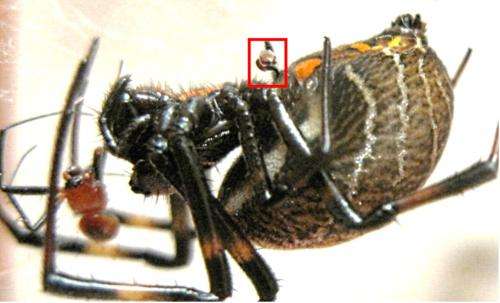February 2, 2012 report
Male spiders of one species lose their genitals after sex to increase sperm count in females

(PhysOrg.com) -- Researchers have known for some time that the male sex organ, called a palp, in orb-web spiders is often broken off during copulation with females; what hasn’t been so clear is why. Now, new research by Daiqin Li of the National University of Singapore and colleagues have found, as they describe in their paper published in Biology Letters, that by breaking off their palp, the male spiders ensure that more of their sperm enters the female after he runs away or is eaten by his partner.
Male orb-web spiders are several orders of magnitude smaller than the females, putting them at a great disadvantage regarding sexual liaisons since the females tend to break off copulation after just an average of seven seconds. Quite often they do so by grabbing the male and eating him. This quick copulation time isn’t really in the best interest of either party, so it appears nature has found a way to make things last longer; when copulation is broken off, so too is the palp, which continues to pump sperm into the female’s body for as long as twenty minutes.
To make this discovery, Li and his team captured 25 pairs of orb-web spiders, N. malabarensis and set them up to copulate on her web in a lab. In so doing they found that every single copulation session ended with at least some damage to the male palp, and in all but 12% of cases, it was severed completely. Each of the pairs was interrupted by the researches at different stages of copulation and dissected to see how much of the sperm from the male had made its way into the female and how much was still in the palp. In this way the team was able to see that sperm counts grew higher even after the palp had been broken off, clearly demonstrating that it was able to pump in more sperm all by itself.
Li and his team theorize that this ability to pump in more sperm after mating, referred to as remote copulation, likely increases the males’ chances of reproducing, as not only does more of his sperm make its way into her body, the broken palp left behind also creates a plug for several hours, preventing other males from mating with her.
Interestingly, the few palpless males (eunuchs) that evade being eaten, wind up serving as guards to help any offspring survive; yet another piece of evolutionary magic at work, furthering the males’ chances of producing heirs.
More information: Remote copulation: male adaptation to female cannibalism, Biol. Lett., Published online before print February 1, 2012, doi: 10.1098/rsbl.2011.1202
Abstract
Sexual cannibalism by females and associated male behaviours may be driven by sexual conflict. One such male behaviour is the eunuch phenomenon in spiders, caused by total genital emasculation, which is a seemingly maladaptive behaviour. Here, we provide the first empirical testing of an adaptive hypothesis to explain this behaviour, the remote copulation, in a highly sexually cannibalistic orb-web spider Nephilengys malabarensis. We demonstrate that sperm transfer continues from the severed male organ into female genitals after the male has been detached from copula. Remote copulation increases the total amount of sperm transferred, and thus probably enhances paternity. We conclude that the mechanism may have evolved in response to sexual cannibalism and female-controlled short copulation duration.
© 2011 PhysOrg.com


















